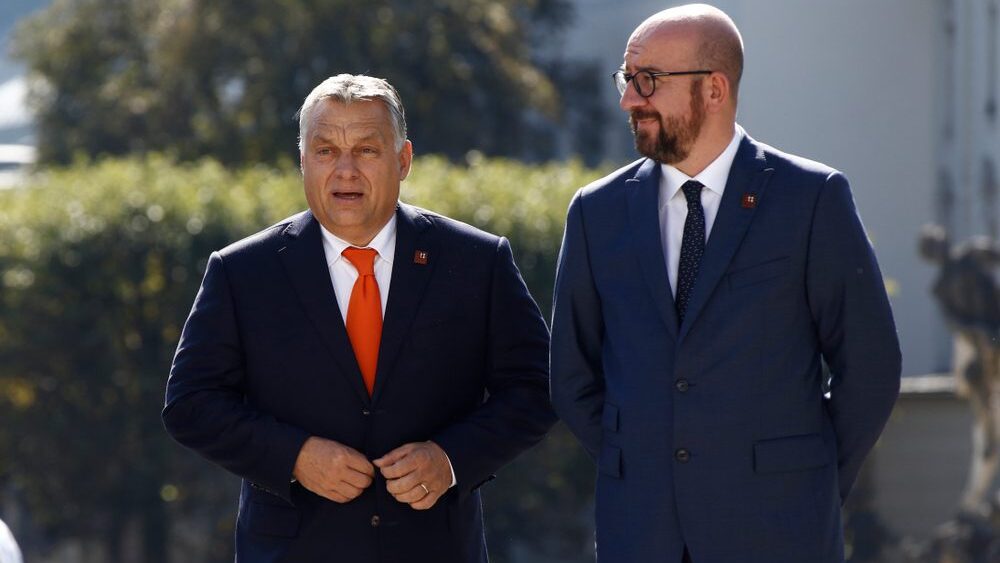
EU President Charles Michel (right) and Hungarian PM Viktor Orbán (left).
Photo: Alexandros Michailides
In a surprise twist, EU Council President Charles Michel announced that he will be running to be a member of the European Parliament (MEP), a position that would require him to leave his current job half a year early. Brussels immediately went into panic mode, as the move opens the door for Hungarian PM Viktor Orbán—the EU establishment’s favorite bogeyman—to take the mantle of provisional president until a new one is elected.
Michel first discussed his plans to run for Parliament with a Belgian newspaper on Sunday, January 7th, sending shockwaves around Brussels. Although the official refused to confirm, many speculate that being a simple MEP is not his ultimate goal, as he could be eyeing several more influential positions, including succeeding Didier Reynolds as Belgium’s Commissioner, or even running for Commission president as the liberal Renew groups Spitzenkandidat after the June elections.
In any case, being elected as an MEP would mean Michel would need to resign from the Council presidency half a year early, turning what would normally be a middle-sized power vacuum into nightmare fuel for the establishment by the current circumstances.
Under EU rules, when a Council president prematurely leaves office before their mandate ends, the provisional role to fill in until a new official is appointed reverts automatically to the head of the country that’s fulfilling the Council’s rotating presidency. Since Hungary assumes the rotating presidency between July and December, this means the provisional president would be none other than Prime Minister Viktor Orbán.
Normally, the Council president is elected by the members of the body for 2.5 years and their mandate can be renewed for another term once it runs out. Michel’s second term would end on November 30th, leaving the rotating presidency a month to organize the election of a new official to fulfill the role in December while the head of that country acts as provisional president for a few weeks. This time, however, it could be a few months.
Many within the EU’s left-leaning establishment have been campaigning to prevent Hungary from taking on the rotating presidency for months, which would not only be unprecedented but an arguably illegal and completely undemocratic move as well. Now, the prospect of the conservative, sovereigntist Hungary simultaneously assuming both the rotating presidency and the role of the president is a pill that proves to be too hard to swallow in Brussels.
Ever since the Sunday announcement, Michel has been facing harsh criticism from the left for opening the door for Orbán. “The captain leaving the ship in the middle of a storm,” liberal MEP Sophie in ‘t Veld reacted on X, referencing the coming election that’s set to strengthen conservatives at the expense of liberals and greens as well as the subsequent Hungarian presidency. “If that is how little committed you are to the fate of the European Union, then how credible are you as a candidate?” the MEP confronted Michel.
At a time when the current establishment is on track toward changing the EU’s internal structures to eventually give more power to Brussels, Orbán is the least welcome person to fill any influential role. Eurofederalists generally perceive the Hungarian prime minister as the enemy of the European project simply for his refusal to subscribe to further centralization that weakens member state competencies and prioritizing national interests when deciding on benchmark policies such as migration or security.
Nonetheless, Michel does not appear to be particularly bothered by the criticism and was quick to offer solutions to his panicking comrades. “There are several options, and if the European Council wants to avoid Viktor Orbán, that is very easy,” the outgoing president told reporters, reminding them that a simple majority vote is enough to change the relevant rules and appoint a caretaker president of choice until December.
However, while it’s relatively simple to bypass an Orbán double presidency, the 27 EU heads of state would still need to agree on who the new provisional (or even permanent) president would be. Choosing a president usually takes months (hence the six-month delay between the elections and appointment of top jobs), so those trying to avoid too much Hungary must either be ready for more compromise than usual or just learn to stop worrying and love Orbán instead.
